Tomorrow Mountain today
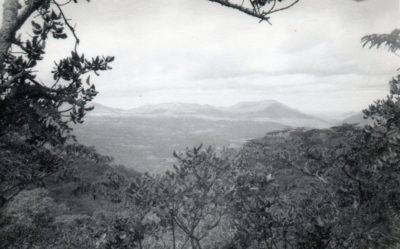
The view from the top of Wedza Mountain towards the Bvumba and Chimanimani Mountains 1960 taken by Ruth Hartley
There were debts to be paid. I knew that. I hope that I’ve made a small repayment in The Tin Heart Gold Mine.
When I was a girl of 16 I lived with my mother and stepfather one day’s walk from Tomorrow Mountain. It stood out against the sky, a long shape humped at both ends like a sleeping lion with its head between its paws facing away from the Sabi Valley.
In the ChiShona language of Zimbabwe the mountain was called Wedza – the place you could get to tomorrow at dawn. I loved Wedza and the farm with all the passion of a romantic teenager.
My stepfather’s farm was called Eldoret – the little place of Gold. It was a small farm and its golden tobacco leaves did not make his fortune.
There were only 80 arable acres and my stepfather owed the Land Bank a huge sum of money. He wouldn’t be able to pay it off tomorrow or ever.
There were 2 roads to the farm from the nearby town, Marondera. One was the long high road along the watershed. The second shorter route crossed two river valleys that flooded when it rained.
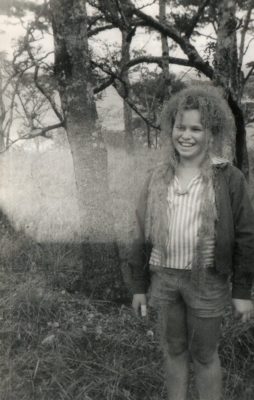
My stepsister on top of Wedza Mountain with a headdress of long trailing blue-green Spanish moss pulled off the trees. It was moist and muddy on the mountain.
Winston Field‘s farm was before the first river. Winston Field would soon become Prime Minister of Rhodesia and the man who succeeded him, Ian Smith, would take the country into a long and bloody war against its own people.
Progressive and regressive politics
It was a strange anomaly that our farming district across the river, but closer to tomorrow’s mountain and further from the town, was more liberal and progressive than Winston Field’s district. It is a relative judgement, but I was sustained and entertained, encouraged and depressed by the open political discussions that took place when the white farmers drank at the clubhouse bar.
I would sit on the bar counter with a glass of Mazoe orange juice and listen to both racist rants and rational economic predictions about the future of my country. The calm, teetotal African barman never spoke. He washed and polished glasses while a Dutch farmer, forced out of Malaysia, talked of beating his labourers with a hosepipe.
The most progressive of the farmers, Norman Travers of Imire, organised a political meeting at his home. The arguments were impassioned.
Unexpectedly, a car drove up and four ZANU African activists asked politely if they could join the all-white meeting. Norman invited them in to join the discussion and offered them tea. If I remember correctly, Africans were not allowed by law to drink the same alcoholic drinks as white people.
University education and debt
Days later my mother and stepfather had a visit from the African schoolteacher at Wedza. He brought his wife and all of his six children. They sat in our lounge in a line on the settee.
“Please can you help me pay for my children’s education,” he asked. My stepfather said that he wasn’t able to do that.
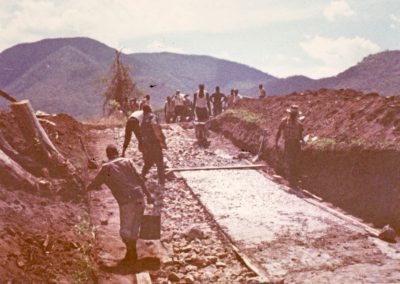
Building Nyamidzi Bridge in Wedza Tribal Trust lands in the 1960s. My stepfather was the overseer for this work after his farm went bankrupt.
I felt really bad about his refusal. I knew my stepfather really struggled to put petrol in the car and run the farm, but how could we not help people who were worse off than us?
I was about to go to university in South Africa. I had studied very hard at school and won a scholarship as well as been given a loan. I also had a grant from the giant companies who mined copper in what was soon to be Zambia. I was white, so these benefits were offered to me while few Africans ever got to sit for their A Level exams or go to university.
There were debts to be paid. I knew that. Not only my stepfather’s Land Bank debts but those we whites owed to the people of Africa. Tomorrow I would write the stories that needed to be told and today I acknowledge some of that debt. I hope that is what I’ve done in The Tin Heart Gold Mine.
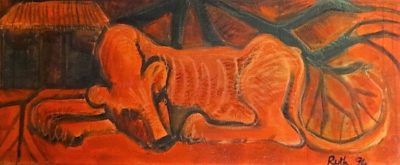
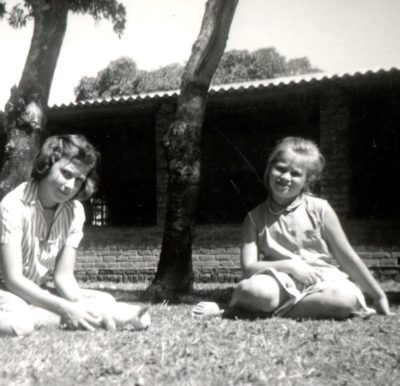
21 Comments on “Tomorrow Mountain and the writing of Today’s Stories”
Lovely Ruth. I shall enjoy reading it, so save me a signed copy.
June – I will have a signed copy for you when I next see you!
A pity that the Post issue date comes out in American format. I thought I was going to read one from November.
Hopefully this will be sorted John.
Hi Ruth,
The post date here on the blog shows “11 March 2017”, which is not American, but I think John’s problem was with the email that arrived in his Inbox showing “Mar 11, 2017”. The date is correct, but it doesn’t follow the British rhythm! The only alternative in MailChimp is to use numeric dates as in 11/03/2017. So we’ve changed it now. In future, email updates from this blog will show the date of posting in the format “dd/mm/yyyy”. I hope this will make your British readers happier! 🙂
Thank you for making it better for we British timekeepers!
A good invite in. Very much look forward to reading ‘Tomorrow Mountain………’ I know it will be more than just a story and for me the walk in the ‘other’s footsteps that your stories require builds up the well of my empathic resources whilst giving me insights into the lives of the other and the turbulent political issues of that particular time.
Hi Krys – this isn’t another book – at least not yet though it might be one day. After The Tin Heart Gold Mine I’ll be writing Hannah’s Housekeeping!
Hi Krystyna – I am not planning to write Tomorrow’s Mountain today – though it would be a wonderful book title. My next book is Hannah’s Housekeeping – can’t wait to shut myself away and start the hard and lovely work of writing.
Really interesting Ruth. Agree with you so much about the debts we owe as white people, not just to Africans, but Aborigines, Maoris, Red Indians, Indians, Malayans, Chinese… Am just re-started on The Tin Heart… after doing what you advised!
You are right Valerie. Thanks for being generous about the book – hope the advice works – let me know!
Ruth, once again your evocative prose makes the hairs on my arms stand up. You capture the landscape, both physical and political, so exquisitely and make me yearn to learn more.
Thank you Kate – you understand the lure of Africa so I am glad you like the stories.
Dear Ruth, so wonderful to read about all the family history, it’s fascinating. Thank you! I shall defo get a copy of the Tin Heart Mine … can’t wait.
It must have been confusing to put up with white racism in your teens but great that it has inspired you to write now or pay your debts. Reading your post led me re-read the chapter of my book ‘Auto’ about being a teenager ( on VSO) in Nigeria in 1963. I was so full of wonder then . The whites were few and generally benevolent in the Yoruba town where I taught and it was all in all such an adventurous and positive experience that I often refer to it as the best year in my life!
I am sure your experience in Nigeria was more positive as a VSO – you had a positive attitude yourself. I found the same positive attitudes in Zambia when I was first there too and that was very pleasant.
You write so beautifully. So interesting to read a bit about your childhood in tomorrow’s mountain and I look forward to reading more!
Thank you Anna
I enjoyed this and the photos Ruth. Thank you
Thanks Ruth for the fascinating glimpse into a Colonial past. So sad that African lives have become even more impoverished under the current regime.
It’s a very mixed story these days in Africa Elisabeth. There are serious problems and there is undoubted poverty but also very exciting developments and achievements. Africans everywhere make a huge contribution to the world intellectually, artistically and commercially